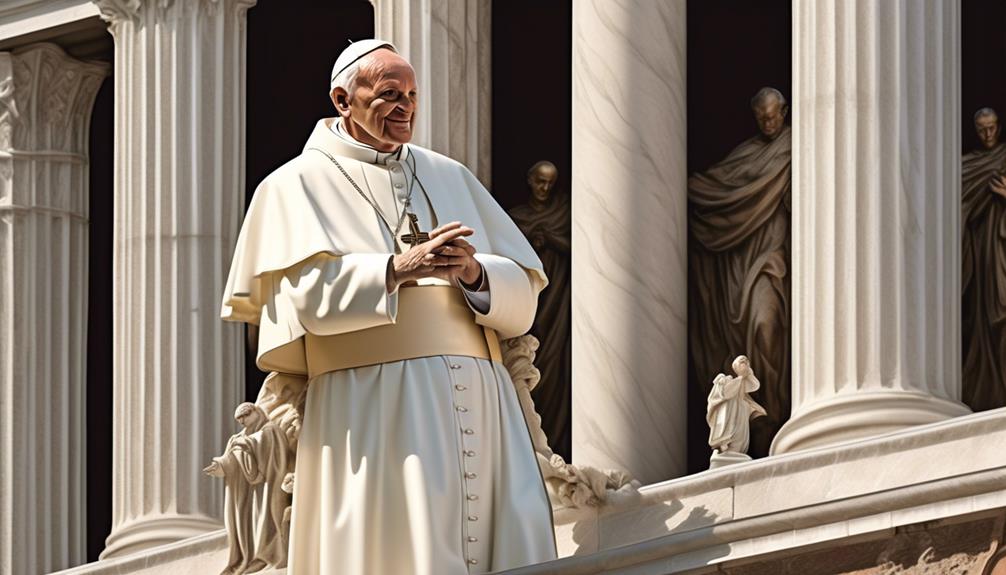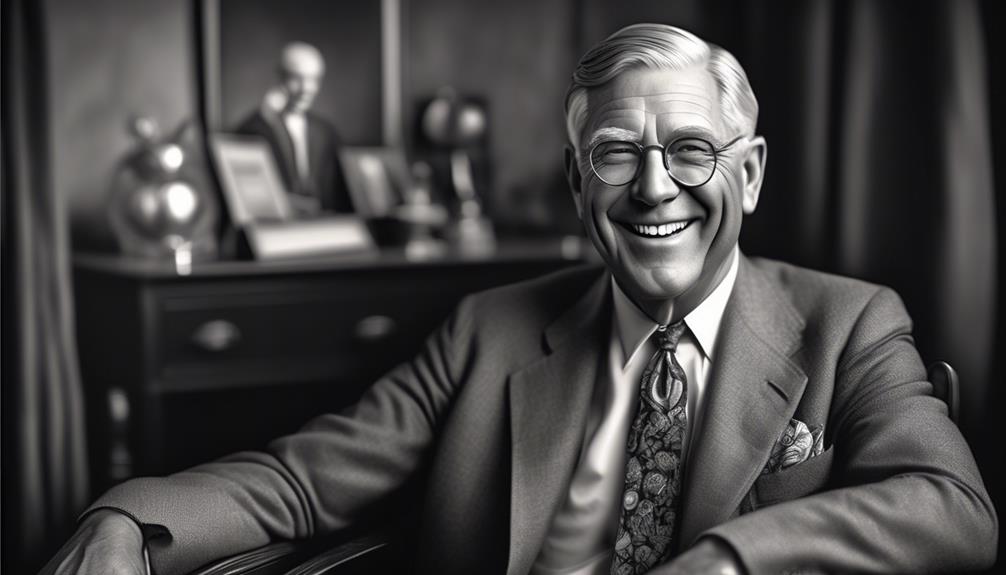Exploring the deep insights of Pope John Paul II, we find ourselves in a realm where belief and spiritual depth merge with the complexities of today’s world. Serving as the 264th leader of the Catholic Church, his teachings still echo among individuals from diverse backgrounds, providing direction, motivation, and comfort.
With a remarkable papacy that spanned over 26 years, Pope John Paul II became a beloved figure, known for his unwavering commitment to social justice, interfaith dialogue, and the promotion of love and forgiveness. Through his quotes, we glimpse his deep understanding of the human condition and his unwavering belief in the transformative power of faith.
Join us as we explore the timeless teachings of this remarkable spiritual leader.
Key Takeaways
- Pope John Paul II was born and raised in Poland, and his early experiences with loss and adversity shaped his compassionate and dedicated approach to his papal responsibilities.
- His election as pope involved a highly structured and carefully orchestrated process, and he wielded significant papal authority to make decisions, teach doctrine, and govern the Church.
- Pope John Paul II had a lasting impact on Catholicism and church modernization efforts, with significant reforms, emphasis on social justice, and embracing technology to expand the reach of the Church.
- Through global outreach initiatives and evolving doctrinal teachings, Pope John Paul II promoted interfaith dialogue, addressed unique challenges faced by different communities, and shaped the Catholic Church's teachings on various topics.
Pope John Paul II's Early Life and Influences
Pope John Paul II's early life and influences shaped his remarkable journey towards becoming the spiritual leader of the Catholic Church.
Born Karol Józef Wojtyła on May 18, 1920, in Wadowice, Poland, he experienced a childhood marked by profound loss and adversity. At the age of nine, he lost his mother, Emilia, followed by his older brother, Edmund, three years later. These early experiences of grief and hardship undoubtedly influenced his deep spirituality and unwavering commitment to serving others.
Raised in a devout Catholic family, young Karol was immersed in the rich traditions and teachings of the Church from an early age. He served as an altar boy and actively participated in his local parish community. This strong foundation of faith and the guidance of his father, a tailor, instilled in him a sense of duty and compassion for others.
Furthermore, growing up in Poland during a time of political upheaval and Nazi occupation greatly impacted Pope John Paul II's worldview. He witnessed firsthand the atrocities committed during World War II and the horrors of the Holocaust. These experiences fueled his determination to fight for justice, human rights, and the dignity of every person.
The Election and Papacy of Pope John Paul II
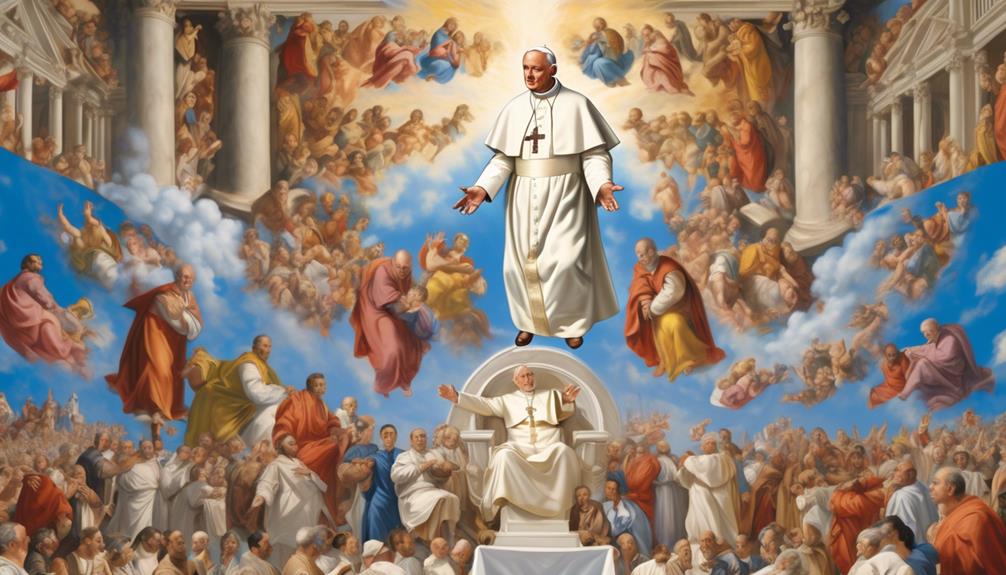
The election and papacy of Pope John Paul II were significant moments in the history of the Catholic Church. The election process itself is a highly structured and carefully orchestrated event, involving the College of Cardinals and their discernment of the next pontiff. Once elected, the pope assumes immense responsibilities, including the spiritual guidance of over a billion Catholics worldwide and the stewardship of the Church's teachings and traditions.
Pope John Paul II's papacy left a lasting impact on Catholicism. He demonstrated his unwavering commitment to promoting social justice, interfaith dialogue, and the sanctity of human life. Throughout his papacy, he advocated for the rights of the poor and vulnerable, speaking out against poverty, inequality, and injustice. He actively engaged in dialogue with leaders of other religions, seeking to foster understanding and cooperation. Furthermore, he was a staunch defender of the sanctity of human life, opposing abortion, euthanasia, and capital punishment.
Pope John Paul II's legacy extends beyond his papacy. He played a key role in the fall of communism in his native Poland and throughout Eastern Europe, using his moral authority to inspire and empower those fighting for freedom and democracy. His extensive travels around the world allowed him to connect with people from all walks of life, spreading the message of peace, love, and faith.
Election Process
During the election process of Pope John Paul II, the Catholic Church carefully deliberated and discerned the successor to the papal throne. The papal election, also known as the conclave process, follows a set of strict procedures outlined by the Apostolic Constitution. The conclave consists of cardinal electors from around the world, who gather in the Sistine Chapel to cast their votes. The election begins with prayer and reflection, followed by a series of ballots until a consensus is reached. The cardinal elected as pope must accept the position and choose a papal name. The process emphasizes the spiritual discernment of the Holy Spirit's guidance, ensuring the selection of a worthy and capable leader for the Church.
| Column 1 | Column 2 |
|---|---|
| Prayer and reflection | Deliberation among cardinals |
| Secret ballots | Consensus-based decision-making |
| Papal acceptance | Papal name selection |
| Spiritual discernment | Holy Spirit's guidance |
| Selection of a worthy leader | Careful consideration of qualifications |
Papal Responsibilities
The election and papacy of Pope John Paul II entailed a multitude of profound responsibilities that demanded a deep sense of spirituality, intellectual acumen, and a steadfast commitment to guiding and shepherding the Catholic Church.
As the 264th Pope of the Catholic Church, Pope John Paul II wielded significant papal authority, which entailed the power to make decisions, teach doctrine, and govern the Church. This authority wasn't simply bestowed upon him, but rather was a result of the centuries-old tradition of papal succession, where the Pope is chosen by the College of Cardinals.
With this authority, Pope John Paul II took on the immense responsibility of leading the Catholic Church, upholding its teachings, and serving as a spiritual shepherd to its followers. He approached this responsibility with unwavering dedication and an unwavering commitment to the well-being of the Church and its faithful.
Impact on Catholicism
After assuming the weighty responsibilities of the papacy, Pope John Paul II's profound impact on Catholicism can be observed through his unwavering commitment to upholding Church teachings and shepherding its faithful.
His papacy witnessed significant church reforms aimed at revitalizing the Catholic Church and strengthening its moral and spiritual foundation.
Through his tireless efforts, Pope John Paul II sought to address the challenges facing the Church in the modern world, promoting interfaith dialogue and fostering a culture of life.
Additionally, his outreach programs aimed to bring the Church closer to the people, emphasizing the importance of social justice and caring for the marginalized.
His charismatic and compassionate leadership inspired millions of Catholics worldwide, leaving an indelible mark on the Church and its followers.
Pope John Paul II's Impact on the Catholic Church
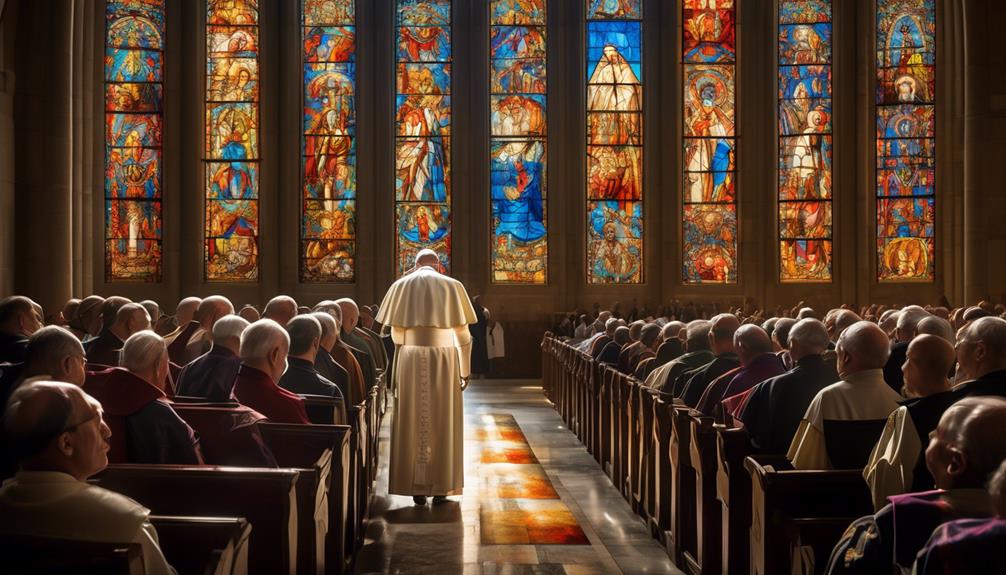
Pope John Paul II's impact on the Catholic Church was profound and far-reaching. His efforts to modernize the Church included embracing technology and engaging with the global community, reaching out to people of different faiths and cultures.
Additionally, his teachings evolved the Church's doctrine on various issues, such as social justice, ecumenism, and the role of women, which continue to shape the Church's direction today.
Church Modernization Efforts
In spearheading the modernization efforts of the Catholic Church, Pope John Paul II implemented a series of reforms that aimed to align the institution with the changing times and address the emerging challenges of the contemporary world.
These efforts included:
- Embracing technology: Pope John Paul II recognized the importance of utilizing modern technologies to spread the message of the Catholic Church. By embracing mass media and the internet, he expanded the reach of the Church and allowed for greater access to information and resources.
- Encouraging interfaith dialogue: The Pope recognized the need for the Catholic Church to engage in dialogue with other religious traditions. He actively sought opportunities to foster unity, understanding, and cooperation among different faiths, emphasizing the importance of respect, tolerance, and mutual cooperation.
- Promoting social justice: Pope John Paul II emphasized the Church's commitment to social justice and the need to address issues such as poverty, inequality, and human rights. He called for a renewed focus on the dignity and rights of every human person, advocating for a more just and compassionate society.
These reforms allowed the Catholic Church to adapt its traditions while remaining true to its core beliefs, ensuring its relevance and vitality in a rapidly changing world.
Global Outreach Initiatives
Global Outreach Initiatives were a significant aspect of Pope John Paul II's impact on the Catholic Church. He sought to extend the reach of the Church's message and engage with diverse cultures and societies around the world. The Pope recognized the importance of global outreach in spreading the teachings of the Catholic Church and promoting unity among believers.
Through international missions, Pope John Paul II aimed to establish closer ties with different nations and foster a sense of solidarity among Catholics worldwide. These initiatives allowed the Church to address the unique challenges faced by various communities and offer support and guidance in their spiritual journeys.
Doctrinal Teachings Evolution
Building upon his commitment to global outreach initiatives, Pope John Paul II made significant contributions to the evolution of doctrinal teachings within the Catholic Church. His impact on the understanding and interpretation of Catholic doctrine can be seen in the following ways:
- Integration of Evolutionary Theory: Pope John Paul II acknowledged the compatibility between evolutionary theory and Catholic doctrine, emphasizing that faith and reason aren't in conflict. He believed that the scientific understanding of evolution can coexist with the belief in God as the creator of all things.
- Theology of the Body: The Pope's teachings on human sexuality and the theology of the body provided a renewed understanding of the human person, emphasizing the dignity and sanctity of the body. This teaching revolutionized the Church's approach to issues such as marriage, contraception, and bioethics.
- Interreligious Dialogue: Pope John Paul II promoted interreligious dialogue, recognizing the importance of ecumenism and understanding between different faith traditions. His efforts towards peace and reconciliation fostered greater understanding and cooperation among religions worldwide.
Through these contributions, Pope John Paul II played a vital role in shaping the Catholic Church's doctrinal teachings, ensuring their relevancy and engagement with the modern world.
The Role of Faith in Pope John Paul II's Quotes
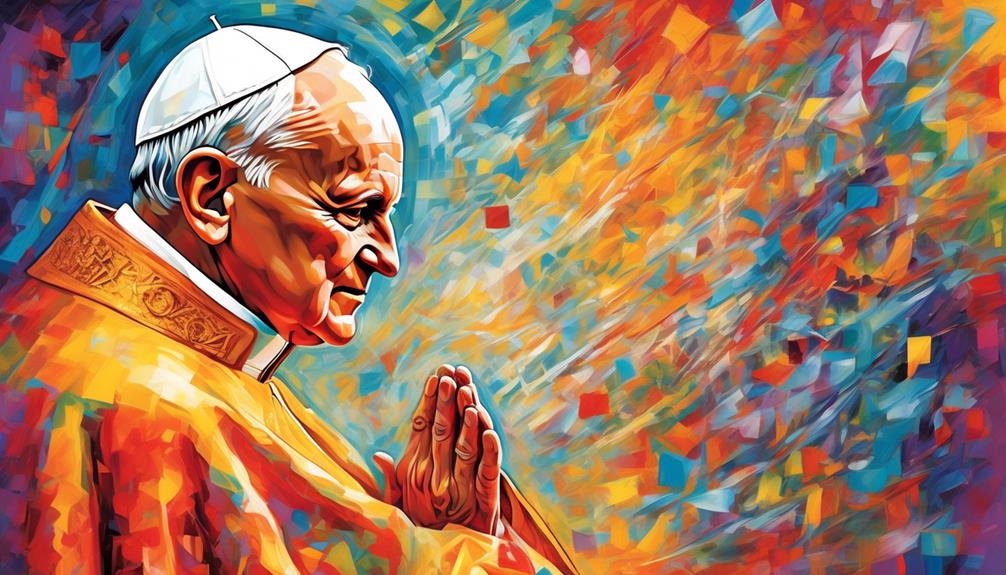
Faith plays a pivotal role in the profound and insightful quotes of Pope John Paul II, illuminating the depths of his theological understanding and personal connection to God. Throughout his pontificate, Pope John Paul II emphasized the importance of faith as the foundation for all other virtues and beliefs. His quotes reflect his unwavering belief in the power of faith to inspire and guide individuals in their journey towards God.
One of the central themes in Pope John Paul II's quotes is the role of faith as a source of inspiration. He often spoke about the transformative power of faith, urging believers to embrace it fully and allow it to shape their lives. In his quote, 'Faith and reason are like two wings on which the human spirit rises to the contemplation of truth,' he highlights the symbiotic relationship between faith and reason, emphasizing that faith provides the necessary inspiration to pursue truth and understanding.
Furthermore, Pope John Paul II's quotes also emphasize the role of faith as a source of guidance. He believed that faith serves as a compass, directing individuals towards the path of righteousness and enabling them to make moral choices. In his quote, 'Do not abandon yourselves to despair. We're the Easter people and hallelujah is our song,' he encourages believers to place their trust in God's providence and find solace in their faith, even in times of difficulty and despair.
Pope John Paul II on Love and Relationships
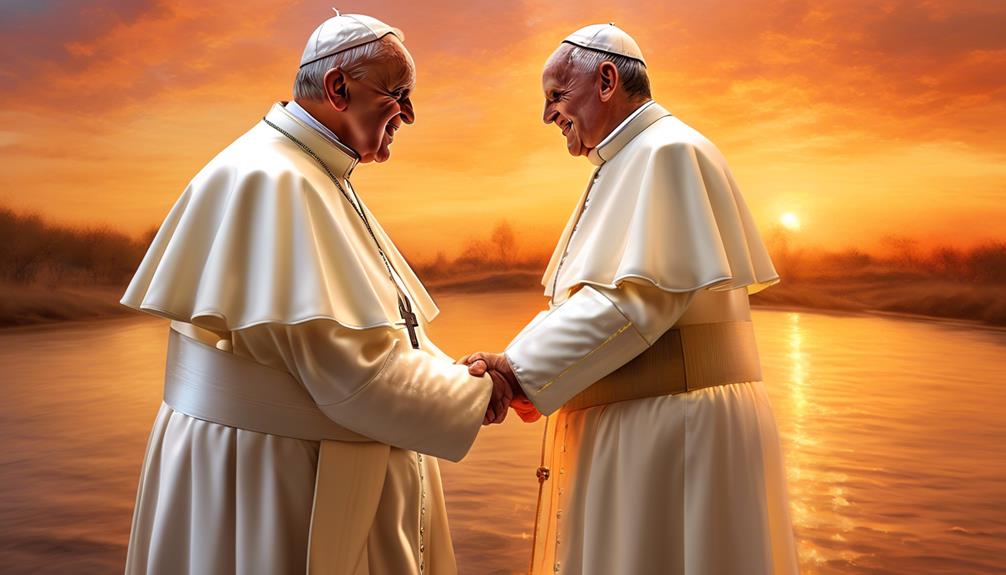
In his profound teachings, Pope John Paul II delves into the intricacies of love and relationships, offering insightful perspectives on the nature of human connection and the role of love in fostering spiritual growth. His views on marriage and teachings on abstinence provide a rich foundation for understanding the importance of these aspects in the lives of believers.
Here are three key insights from Pope John Paul II on love and relationships:
- The Sacrament of Matrimony: Pope John Paul II emphasized the sacredness of marriage, viewing it as a sacrament that reflects the love between Christ and the Church. He believed that marriage is a lifelong commitment, a partnership rooted in self-giving love, and a means of sanctification for the spouses.
- The Dignity of Love: Love, according to Pope John Paul II, isn't merely an emotion but a personal choice and commitment. He taught that love should be selfless, respectful, and aimed at the well-being of the other person. True love involves sacrifice, forgiveness, and a constant effort to grow in virtue.
- The Call to Abstinence: Pope John Paul II emphasized the importance of abstinence before marriage as a means of preserving the sacredness of the marital union. He believed that abstinence allows individuals to develop self-control, respect for one another, and a mature understanding of the true meaning of love.
Through his teachings, Pope John Paul II offers a profound understanding of love and relationships, inviting believers to embrace the divine calling of marriage and to cultivate virtuous love in all aspects of their lives.
Pope John Paul II's Message of Hope and Resilience

Pope John Paul II's message of hope and resilience resonates deeply with believers, offering a profound source of inspiration and strength in navigating the challenges of life. His powerful words continue to guide and encourage individuals, reminding them of the importance of faith and trust in God's plan. Through his inspirational quotes, Pope John Paul II emphasized the significance of maintaining hope even in the face of adversity.
One of his notable quotes is, 'Do not abandon yourselves to despair. We're the Easter people, and hallelujah is our song.' This message of faith speaks to the resilience of the human spirit and the eternal hope found in the resurrection of Christ. It reminds us that even in the darkest moments, there's always a glimmer of light that can guide us towards a brighter tomorrow.
Another quote that encapsulates Pope John Paul II's message of hope is, 'The future starts today, not tomorrow.' This statement serves as a call to action, urging individuals to embrace the present moment and take charge of their lives. It encourages believers to cultivate hope and resilience by actively working towards a better future while trusting in God's providence.
Pope John Paul II's message of hope and resilience is a testament to his unwavering faith and deep understanding of the human condition. His inspirational quotes continue to inspire and uplift believers, reminding them of the power of hope in overcoming life's challenges. Through his message of faith, he leaves behind a legacy that encourages individuals to never lose hope and to always strive for a better tomorrow.
Pope John Paul II on the Value of Human Life
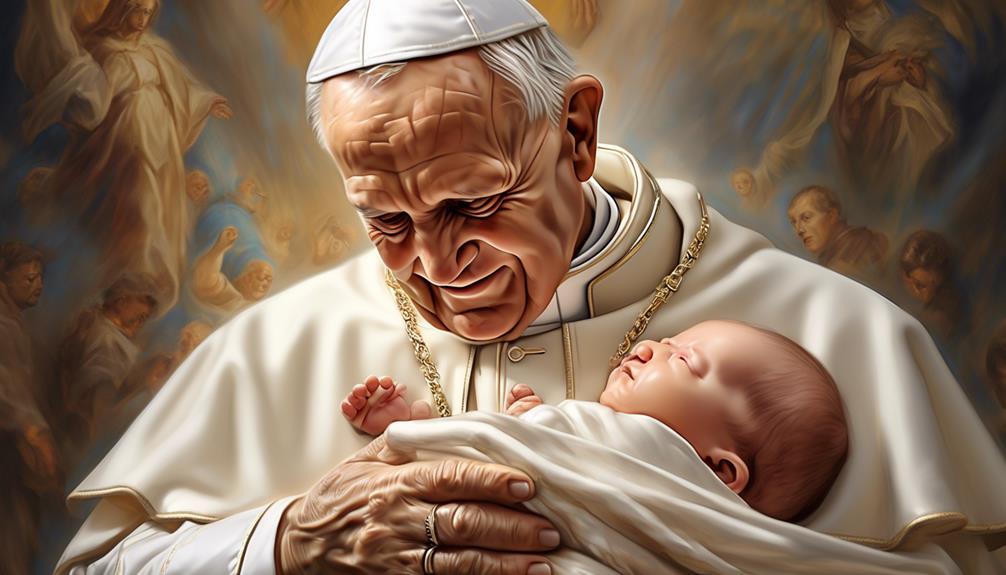
As we explore Pope John Paul II's perspective on the value of human life, we're reminded of the profound significance he placed on the sanctity of all life.
The Pope emphasized the inherent dignity and worth of every individual, regardless of their circumstances or abilities.
His teachings called for the protection and respect of all human life, from conception to natural death, recognizing it as a precious gift from God.
Sanctity of All Life
The sanctity of all life, as emphasized by Pope John Paul II, serves as a theological foundation for understanding the intrinsic value and dignity of every human being. This concept, deeply rooted in Catholic teachings, has been a driving force behind the pro-life movement.
When we contemplate the sanctity of life, we're confronted with the profound truth that each and every person is created in the image and likeness of God. This realization evokes a range of emotions within us, including awe, reverence, and compassion. It compels us to recognize the sacredness of every human life, from conception to natural death.
The sanctity of all life calls us to protect and defend the vulnerable, to promote justice and equality, and to foster a culture of life that respects and cherishes the dignity of every person.
Dignity and Worth
In understanding the value of human life, we are compelled to recognize the inherent dignity and worth that every individual possesses, as emphasized by Pope John Paul II. The late Pope was a fervent advocate for human rights, firmly believing in the sanctity of all life and the fundamental dignity of every person. He eloquently articulated this belief, stating that "the dignity of the human person is the cornerstone of human rights." Pope John Paul II's teachings on the value of human life serve as a reminder that each person, regardless of their background or circumstances, possesses inherent worth and deserves to be treated with dignity. This message is particularly relevant in a world where human rights violations continue to be a pressing issue.
| DIGNITY AND WORTH | HUMAN RIGHTS |
|---|---|
| Inherent to every individual | Fundamental to human rights |
| Emphasized by Pope John Paul II | Cornerstone of human rights |
| Reminds us of our worth | Upholds the dignity of every person |
Protection and Respect
Pope John Paul II's teachings on the value of human life underscore the imperative of safeguarding and honoring the inherent dignity and worth of every individual. His profound insights on protection and respect serve as a guiding light for all who seek to uphold the sanctity of human life.
Three key teachings from Pope John Paul II's pontificate evoke a deep emotional response, urging us to reflect on our responsibilities towards our fellow human beings:
- The protection of human life is non-negotiable and must extend from conception to natural death. It calls upon us to recognize the inviolable dignity of every person, regardless of their stage of development or health condition.
- Respect for human life demands that we actively work towards the eradication of violence and injustice, fostering a society where all individuals are treated with compassion and fairness.
- Genuine respect for human life requires us to embrace a culture of encounter and solidarity, breaking down barriers and promoting the unity of the human family. Through genuine love and understanding, we can build a world where every person is valued and protected.
Pope John Paul II's teachings remind us that protection and respect aren't mere ideals, but essential principles that demand our unwavering commitment. They challenge us to examine our actions and attitudes towards others, urging us to strive for a society that upholds the inherent worth of every human person.
Pope John Paul II's Stance on Social Justice Issues
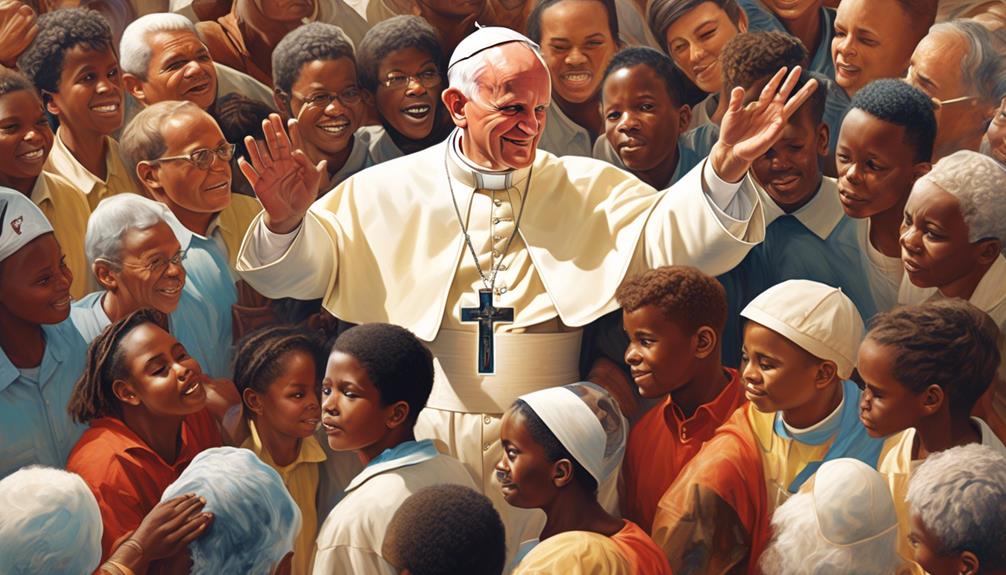
Throughout his pontificate, Pope John Paul II consistently emphasized the importance of social justice and its integral role in promoting human dignity and the common good. His impact on social justice and advocacy for human rights were central to his papacy, as he sought to address the systemic injustices and inequalities that plagued society.
Pope John Paul II recognized that social justice isn't just a political or economic issue, but a moral imperative rooted in the principles of Catholic social teaching. He believed that every person, regardless of their background or circumstances, possesses inherent dignity and worth, and therefore should be treated with respect and fairness.
The Pope's stance on social justice issues was influenced by his deep understanding of the Gospel message, which calls for solidarity and compassion towards the marginalized and vulnerable. He spoke out against poverty, oppression, and discrimination, urging individuals and governments to work towards creating a more just and equitable society.
In his encyclical letter, Centesimus Annus, Pope John Paul II emphasized the need for economic systems that prioritize the well-being of all people, particularly the poor. He called for a society that values the dignity of work, ensures just wages, and provides access to basic necessities such as education and healthcare.
Pope John Paul II's commitment to social justice extended beyond words. He actively engaged in efforts to promote peace, reconciliation, and dialogue among nations, seeking to heal the wounds of conflict and division. Through his actions and teachings, he inspired countless individuals to work towards a more just and compassionate world.
Pope John Paul II's Teachings on Forgiveness and Mercy
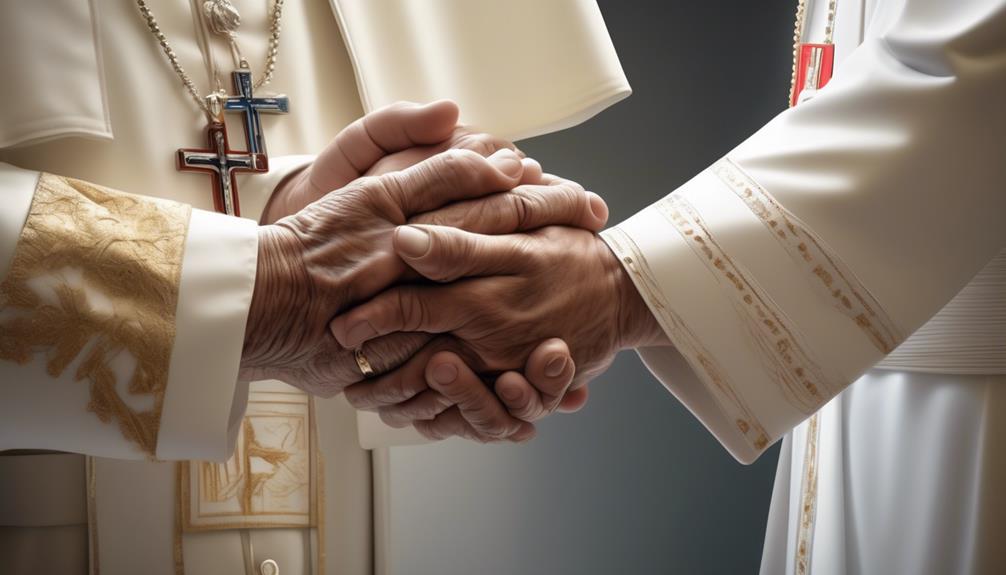
One of the central themes in Pope John Paul II's teachings was the profound importance of forgiveness and mercy in the Christian faith. His teachings on these topics emphasized the transformative power of forgiveness in healing wounds and embracing reconciliation.
Here are three key aspects of Pope John Paul II's teachings on forgiveness and mercy:
- Healing wounds: Pope John Paul II believed that forgiveness has the power to heal the wounds caused by sin and injustice. By forgiving others, we not only free ourselves from the burden of anger and resentment, but we also open ourselves to God's healing grace. This healing process allows us to experience true freedom and peace in our hearts.
- Embracing reconciliation: The Pope emphasized the importance of reconciliation as an essential step in the process of forgiveness. He encouraged individuals and communities to seek reconciliation with God and with one another, promoting harmony and unity. Through reconciliation, we can restore broken relationships and work towards building a more just and compassionate society.
- Divine mercy: Pope John Paul II frequently spoke about God's abundant mercy, emphasizing that no sin is too great to be forgiven. He encouraged individuals to approach the sacrament of reconciliation with confidence, knowing that God's mercy is always available to those who seek it. By embracing God's mercy and extending it to others, we can become instruments of healing and reconciliation in the world.
Pope John Paul II's Call for Interfaith Dialogue
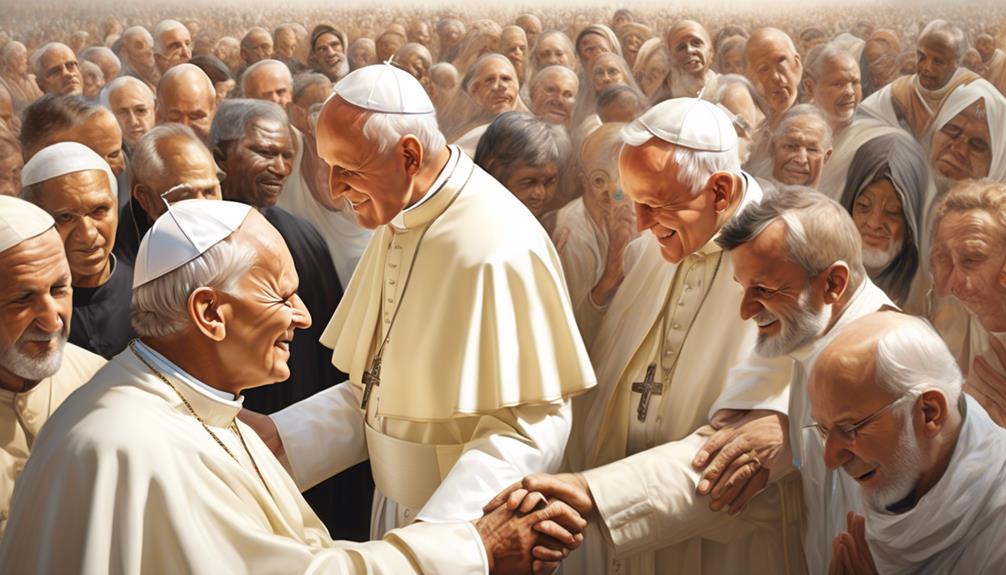
In his efforts to foster understanding and cooperation among different religious traditions, Pope John Paul II emphasized the necessity of engaging in interfaith dialogue. He recognized that dialogue between different faiths is crucial for promoting unity and peace in the world. The Pope believed that interfaith dialogue shouldn't be approached as a means to convert others or to compromise one's own beliefs, but rather as an opportunity to learn from one another and to build bridges of understanding.
Pope John Paul II firmly believed that interfaith dialogue should be based on mutual respect, openness, and a genuine desire to seek common ground. He urged religious leaders to engage in sincere and honest conversations, where they could share their beliefs, values, and traditions, while also listening attentively to the perspectives of others. Through such dialogue, the Pope believed that individuals from different religious backgrounds could discover shared values and principles that could serve as a foundation for cooperation and collaboration.
The Pope's call for interfaith dialogue was rooted in his belief that all religions ultimately seek to promote peace, justice, and the well-being of humanity. He recognized that despite theological differences, there are universal values that can be found across religious traditions, such as love, compassion, and the pursuit of truth. By engaging in interfaith dialogue, Pope John Paul II hoped to promote a deeper understanding and appreciation of these shared values, fostering greater harmony and cooperation among people of different faiths.
The Enduring Legacy of Pope John Paul II
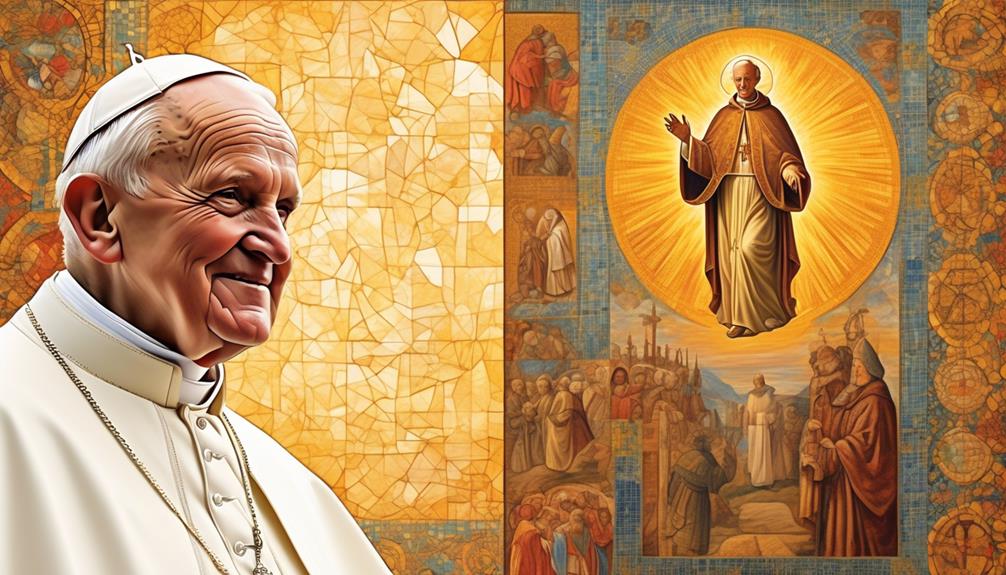
As we explore the enduring legacy of Pope John Paul II, it's evident that his commitment to interfaith dialogue served as a catalyst for fostering unity and cooperation among diverse religious traditions. His enduring impact on the world can be seen through his strong spiritual leadership, which continues to inspire and guide individuals of various faiths.
- Transformation: Pope John Paul II's unwavering dedication to interfaith dialogue transformed the way people perceive and interact with different religious traditions. His teachings emphasized the importance of respect, understanding, and collaboration, encouraging individuals to embrace the shared values that unite humanity.
- Bridge Building: Through his tireless efforts, Pope John Paul II built bridges between different faith communities, fostering a sense of solidarity and mutual respect. He recognized the common threads that run through various religious traditions and worked towards promoting dialogue, peace, and cooperation among them.
- Global Influence: Pope John Paul II's spiritual leadership transcended geographical boundaries, impacting people worldwide. His message of love, forgiveness, and compassion touched the hearts of millions, inspiring individuals to live virtuously and strive for a better world. His legacy continues to resonate with people of all backgrounds, reminding us of the power of faith and the importance of interfaith dialogue in building a harmonious global community.
Pope John Paul II's enduring impact and spiritual leadership serve as a reminder of the transformative power of dialogue and cooperation among diverse religious traditions. His legacy inspires us to seek common ground, build bridges, and work towards a more united and inclusive world.
Frequently Asked Questions
How Many Quotes Are Attributed to Pope John Paul Ii?
We have found numerous quotes attributed to Pope John Paul II, reflecting his profound wisdom and spiritual guidance. His words resonate with people from all walks of life and have left a lasting impact on society.
It's remarkable how his teachings and messages have touched the hearts of the youth, inspiring them to embrace their faith and strive for a better world. His words continue to be a source of inspiration and guidance for generations to come.
What Were Some of the Major Challenges Pope John Paul II Faced During His Papacy?
When reflecting on the challenges faced by Pope John Paul II during his papacy, it's evident that he encountered numerous obstacles that had a lasting impact on the Catholic Church. These challenges ranged from the fall of communism in Eastern Europe to the internal struggles within the Church itself.
Despite these difficulties, Pope John Paul II's unwavering faith and charismatic leadership allowed him to navigate through these turbulent times, leaving a profound and lasting legacy on the Catholic Church.
How Did Pope John Paul II Contribute to the Growth of the Catholic Church?
Pope John Paul II played a significant role in the growth of the Catholic Church through his influential leadership and commitment to interfaith dialogue.
His unwavering dedication to spreading the teachings of Christ and building bridges between different religions fostered unity and understanding.
What Were Some of the Key Themes or Messages in Pope John Paul Ii's Quotes?
Key themes and messages in Pope John Paul II's quotes encompassed faith, love, hope, peace, human dignity, family values, social justice, unity, forgiveness, mercy, and the importance of prayer.
His profound words emphasized the importance of these virtues in our lives, inspiring us to live in accordance with the teachings of the Catholic Church.
Through his quotes, Pope John Paul II conveyed the significance of embracing these values to foster a more compassionate and harmonious world.
How Did Pope John Paul Ii's Teachings on Forgiveness and Mercy Impact the Catholic Church and Its Followers?
Pope John Paul II's teachings on forgiveness and mercy had a profound impact on the Catholic Church and its followers. His emphasis on these virtues echoed throughout his pontificate, inspiring individuals to embrace forgiveness and extend mercy to others.
What Influence Did Pope John Paul II Have on Mahatma Gandhi’s Philosophy and Quotes?
Pope John Paul II’s influence on Mahatma Gandhi’s philosophy and quotes is significant. The Pope’s message of peace and non-violence aligned with Gandhi’s beliefs, leading to a deeper understanding of the power of love and compassion. This is evident in many mahatma gandhi quotations to reflect the impact of Pope John Paul II’s teachings.
Conclusion
In conclusion, Pope John Paul II's quotes continue to inspire and resonate with people worldwide.
One interesting statistic is that during his papacy, Pope John Paul II traveled to over 129 countries, making him the most traveled pope in history.
His teachings on love, forgiveness, social justice, and interfaith dialogue have left an enduring legacy on the Catholic Church and beyond.
Through his words, he encouraged individuals to embrace faith and strive for a more compassionate and inclusive world.
